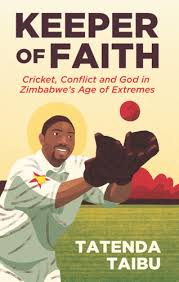Keeper of Faith
Martin Chandler |Published: 2019
Pages: 246
Author: Taibu, Tatenda
Publisher: deCoubertin Books
Rating: 4 stars

The sub-title of Tatenda Taibu’s autobiography is Cricket, Conflict and God in Zimbabwe’s Age of Extremes. The explicit reference to christianity should not however put off any potential reader. There is no preaching in Taibu’s book and the reference to the importance of his God in his life is simply that, no opinions are given or advice proffered as to what Taibu’s reader’s spiritual life should consist of.
There are very few books on Zimbabwean cricket, but those there are excellent and, with the publication of Keeper of the Faith the story is, for the time being reasonably well chronicled. Duncan Fletcher’s autobiography starts the story, which Henry Olonga took up to the time of his departure from Zimbabwe following his and Andy Flower’s black armband protest in 2003.
National coach Alan Butcher took up the story in 2010 in his splendid Good Murungu, and now, with some overlap at both ends, Taibu has dealt with the period in-between and then brought the story up to date.
In telling his own story Taibu has one major advantage over most cricketers, that being the context in which it is set. The vast majority of cricketers who commit pen to paper have first world upbringings, so in the main the stories of their first two decades are simply variations on a theme. Tabu’s story is very different, his family background being rooted in third world poverty. The initial part of the story explaining how his parents overcame adversity to reach a position of relative affluence draws the reader in from the outset.
A decent start in life notwithstanding Taibu’s father died young and his mother passed when he was only 17. He was not the oldest child in the family, but by then was already an international cricketer, so in a position of considerable responsibility towards his siblings.
Most who read this book will remember Taibu. He was an accomplished wicketkeeper, more than useful batsman and in 2004, still not 21, he became the youngest Test captain in the history of the game.
One of the very first black cricketers to progress through Zimbabwe’s development programme such responsibility in a week side must have been daunting, and the reader is left to wonder what, in a stronger side, Tabu might have achieved. If the constant rearguard actions were not enough Taibu also, of course, had to deal the internal machinations of the cricket authorities and the government of his country.
It did not take long for Taibu to lose his innocence as far as the realities of playing cricket for Zimbabwe are concerned and he does not hesitate to name names and lay blame where it is due. The manner in which those in authority over him tried to control him is disturbing, and the way he stood up to the bullies admirable.
It is remarkable to think that even now Tabu is only just 36, almost a year younger than Jimmy Anderson. If events had unfolded differently in Zimbabwe he might have still been playing Test cricket now, and indeed have a few years left yet. As it is he has missed a huge amount of cricket, but even then has played 28 Tests and 150 ODIs.
There is plenty of cricket in Keeper of Faith, Taibu describing the cricket he played in the context of the ups and downs of his and his country’s life. But there is a lot more besides. His refusal to accept a situation whereby as captain he was in a much better financial position than his team is explained, as are his clashes with men like Peter Chingoka and Ozias Bvute. A much darker episode, one that involved a ‘meeting’ with the Deputy Minister of Information in Robert Mugabe’s administration, is also recounted. With the exception of Henry Olonga’s Taibu’s autobiography is most certainly like no other I have read before.
Now based in England Taibu has, unlike Olonga, at least to a certain extent, re-established a relationship with cricket in Zimbabwe although, having been appointed as a selector, he and his former skipper Heath Streak both found their services dispensed with after Zimbabwe failed to qualify for the 2019 World Cup. Taibu has, I believe, now made a comeback (by no means his first) in Sri Lanka, although his book does not mention that, preferring to close on a rather more downbeat but surely more important note, with Taibu expressing the view that until violence and threat of violence cease to be the chief tactic amongst those with power in our country, a sense of fear will continue to pervade our society, and things will not get any better.
As far as the book itself is concerned there is a foreword from Andy Flower, and an afterword from Stuart Matsikenyeri. Keeper of Faith is well written, although there is the odd typo and some sharper editing might have avoided an occasional bout of repetition. In addition any cricketing autobiography will benefit from a few statistics, and an index is always to be welcomed and neither are present here. Nonetheless the power of the narrative and a decent set of photographs mean that Keeper of Faith is well worth fours stars, and is certainly recommended.







Leave a comment